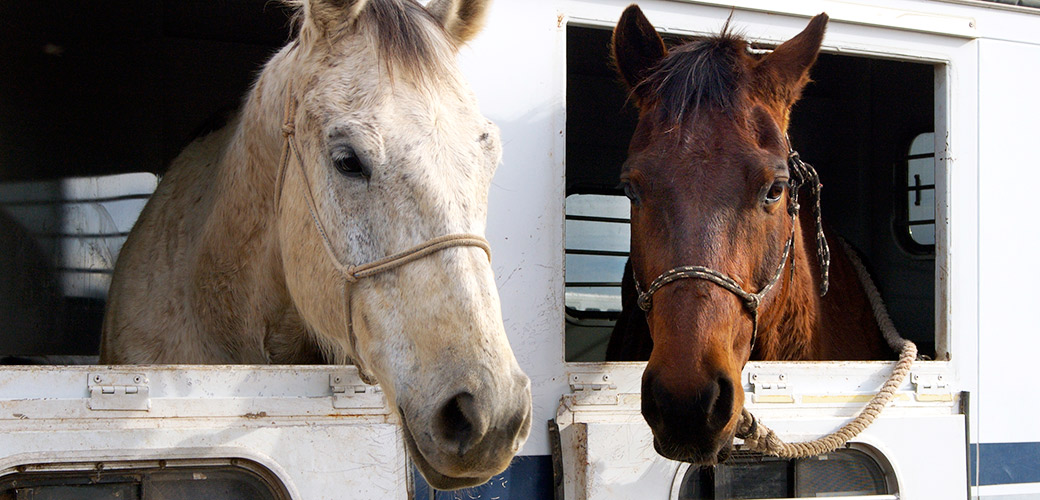
Horse Slaughter

The Issue
Latest News
Horse Slaughter Is Not Euthanasia.
In the year 2024, approximately 20,000 American horses were trucked over our borders to be slaughtered for human consumption. Until this practice is banned and Congress passes a law against slaughter here in the U.S., no horse is safe.
The term “horse slaughter” refers exclusively to the killing horses for human consumption. Horse slaughter is NOT humane euthanasia. While “euthanasia” is defined as a gentle, painless death provided in order to prevent suffering, slaughter is a brutal and terrifying end for horses.
Horses bound for slaughter (who may include pregnant mares, foals and horses who are injured or blind) are commonly and legally shipped for more than 24 hours at a time in crowded trucks without food, water or rest. The methods do not uniformly provide quick, painless deaths for all, and there are documented instances in which horses have been observed conscious during dismemberment. As flight animals, horses commonly respond to a noisy environment where they see, smell and sense danger by flinging their heads in the kill box, creating obvious potential for multiple injuries during stunning.
Horse Slaughter in the United States
The last three U.S. slaughterhouses — two in Texas and one in Illinois, all foreign-owned — were shuttered in 2007. In 2006, these facilities killed more than 104,000 horses for human consumption, shipping the meat overseas.
Slaughterhouses have proved to be environmentally damaging as well as economically draining to the communities that have housed them. Notably, communities with experience hosting horse slaughter facilities do not want them back: Texas and Illinois have enacted laws that specifically ban selling, giving and possessing horse meat intended for human consumption.
Meet Camille, Mama and Twister, Phoenix and Journey, who were bound for slaughter before fate stepped in. Their miraculous stories inspire our work to create brighter futures for equines.
Horse Slaughter Abroad
Though exports have been dropping in recent years, tens of thousands of American equines continue to be shipped to slaughter across our borders annually. In 2024, 19,000 horses were trucked over our borders to slaughter facilities in Mexico and Canada.
Reopening slaughterhouses in America is not the answer to ending this form of cruelty. In fact, even when horse slaughter facilities operated in the United States, tens of thousands of American horses were still exported to other countries for slaughter.
Additionally, long-distance transport without welfare and safety protocols that are enforced is an inherently cruel aspect of this industry. A recent peer-reviewed study found that 79% of slaughtered horses had excessive bruising from transport-related injuries, and the USDA’s own inspection documents revealed similar gruesome injuries when horse slaughter plants were operating in the U.S.
Impacts on the Equine Community
Despite horse slaughter’s end within the U.S., the underground industry continues to prey on horse owners, trainers, businesses, and adoption organizations throughout the country. At auctions, “kill buyers” — individuals that routinely sell equines to slaughter for profit — actively outbid good homes and adoption organizations, forcing them to spend precious resources to save an animal that may otherwise have had a safe place to go. These individuals also often pose as good homes to owners looking to rehome their beloved equine partner, and later sell the animals to abattoirs in Canada and Mexico. The fear that this predatory behavior strikes into the equine community can create additional risks to equine welfare. The ASPCA is at the forefront of addressing risks on the ground, but such negative outcomes will persist so long as American horses are shipped across our borders for meat.
The Future
Until a ban is in place, every American horse is at risk of meeting this fate. Fortunately, the Save America’s Forgotten Equines (SAFE) Act was reintroduced in Congress earlier this year. The bill would prohibit the slaughter of horses for human consumption in the United States and ban their export abroad for that purpose — but we need your help to ensure Congress passes this important legislation.


